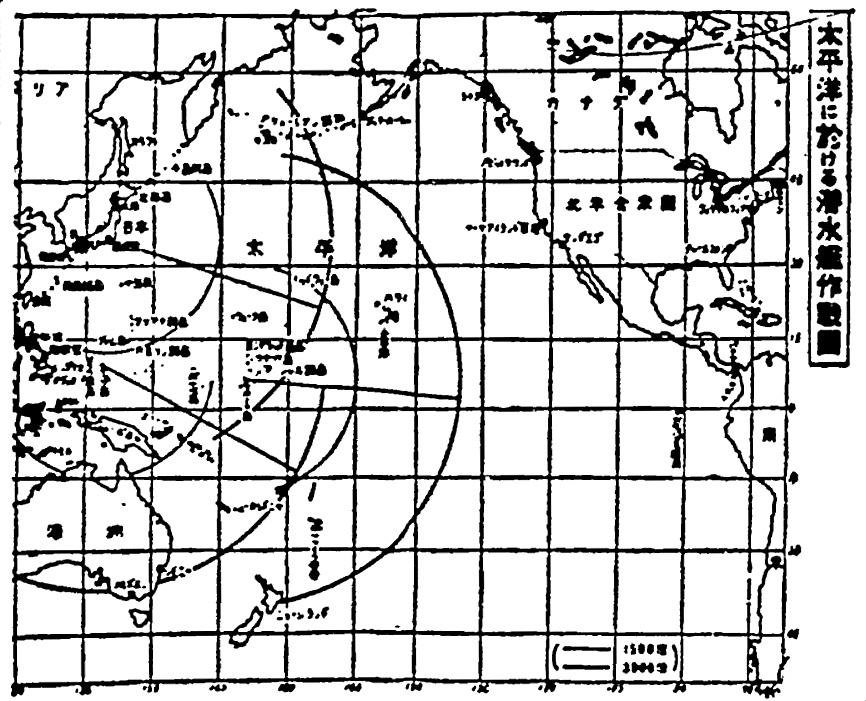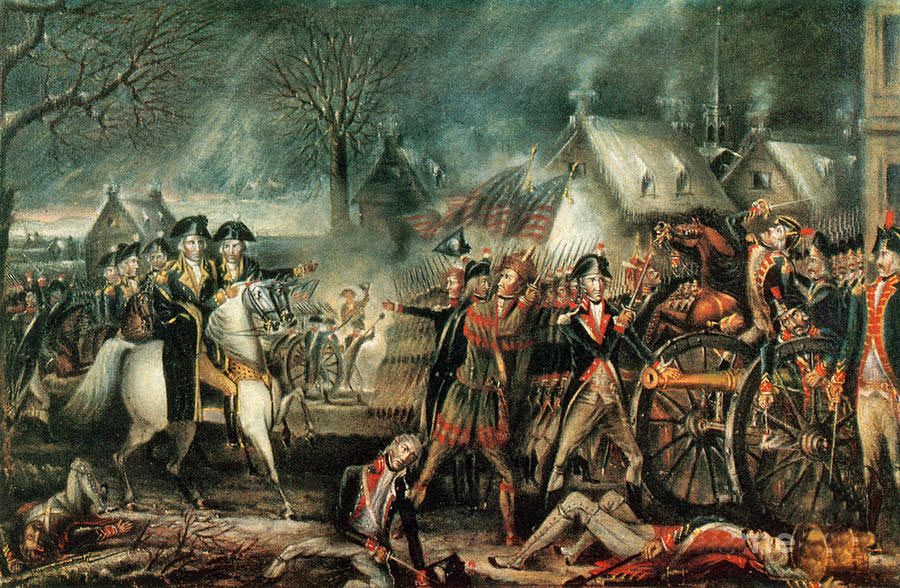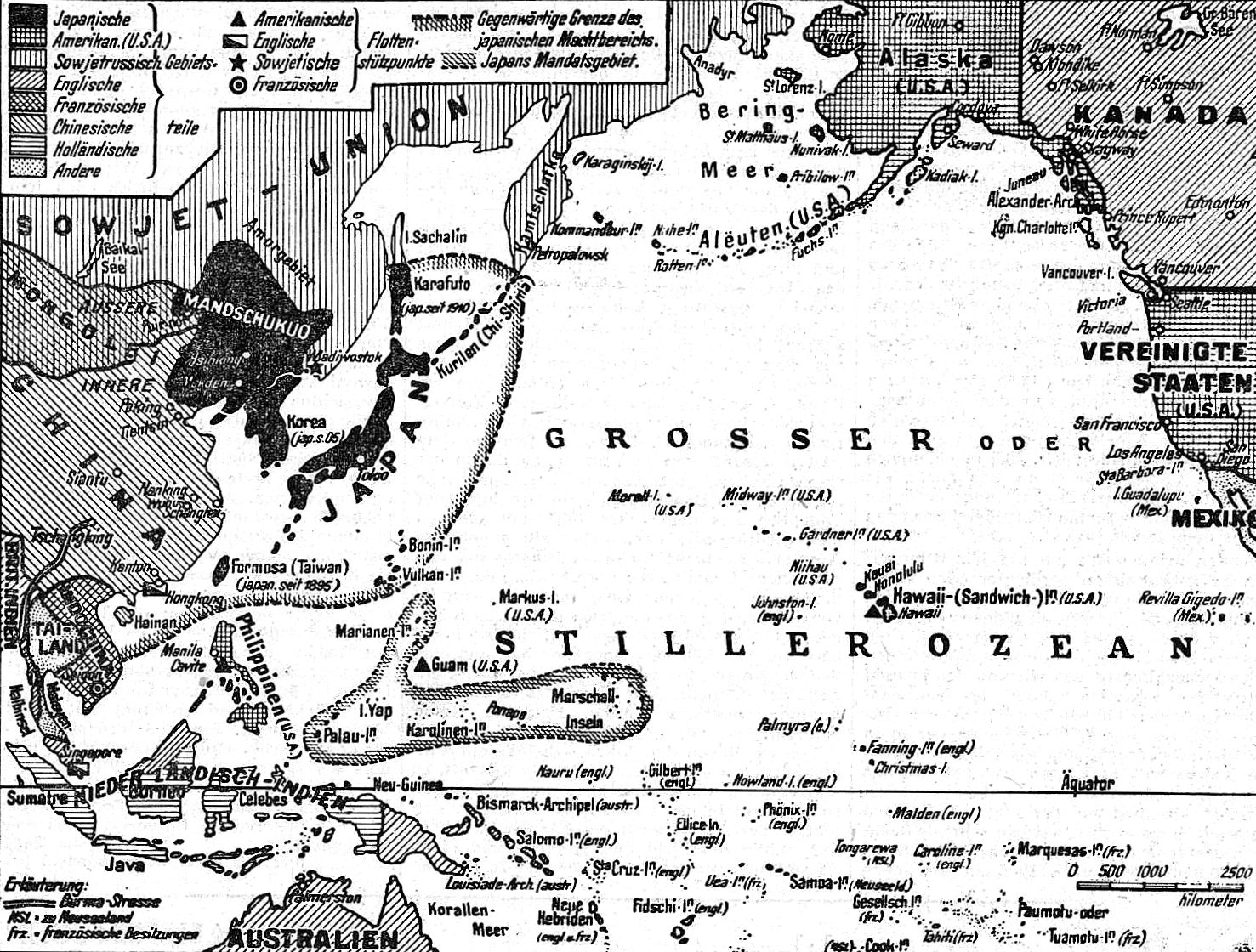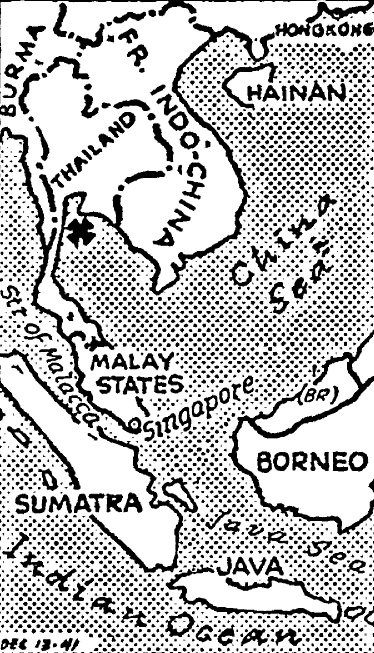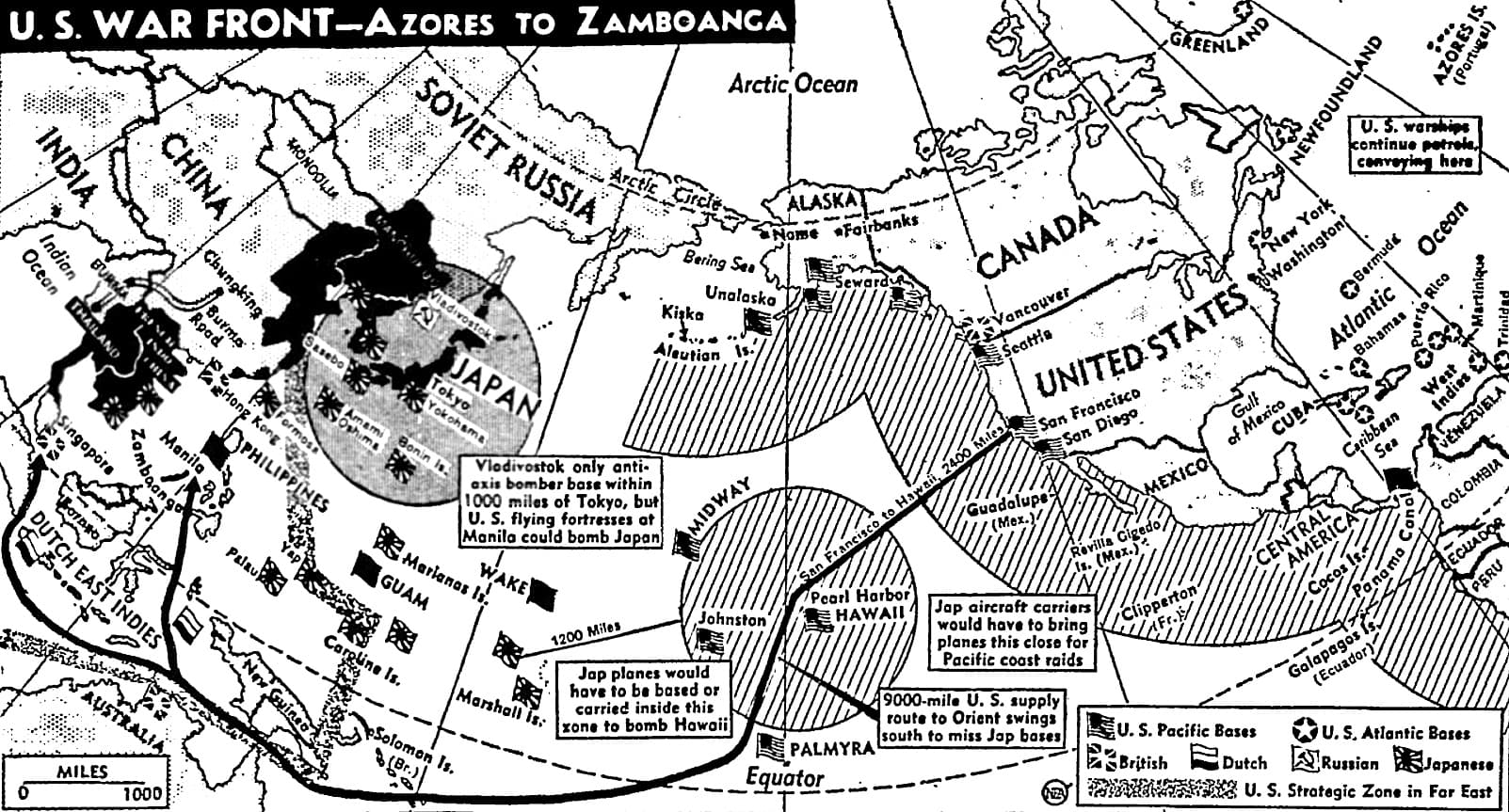Oriental says he exposed attack plan on U.S. Pacific possessions last year
December thrust by Japs predicted by Sino-Korean league – Second-rate men and equipment used in China, leader says
By Helen Buchalter, Scripps-Howard staff writer
This map, taken from a Japanese naval textbook, shows the triple route of attack in the Pacific. The symbols at the right read, ‘Imperial Japanese Naval Attack.’
WASHINGTON (SHS) – A map, extracted from a Japanese naval textbook and showing the plan of attack almost exactly as it occurred Sunday, was turned over to the American Naval Intelligence a year ago last October.
Information gathered from secret sources, suggesting that Japan would attack our Pacific possessions either in December 1941 or February 1942 was sent to the State Department more than a month ago.
The warnings were sent by an underground information-gathering organization known as the Sino-Korean People’s League, which set up a Washington office in 1939.
The most frustrated man in Washington today is Kilsoo K. Haan, 40-year-old Korean representative of the league, whose scrapbook is a tragic memento of warnings aimed desperately at putting the United States on the alert for just such an attack as shocked the nation December 7.
Letter to Hull
The letter, sent to Secretary Hull October 28, 1941, reads in part as follows:
“Hirota, former foreign minister, now the ‘big stick’ of the Black Dragon Society, in their August 26 meeting, told of the news that War Minister Tojo has ordered a total war preparation to meet the armed forces of the United States in this Pacific emergency. Tojo is said to have told him of the Navy’s full support of his policy against America.
“He also spoke of Tojo giving orders to complete the mounting of guns and rush supplies of munitions to the Marshall and Carolina group [mandated islands] by November 1941. Hirota and others present in the meeting freely discussed and expressed opinions as to the advantages and consequences of a war with America. Many expressed the most suitable time to wage war with America as December 1941 or February 1942. Many said:
“‘Tojo [now Premier] will start the war with America and after 60 days Tojo will reshuffle the cabinet and become virtually a great dictator.’ ”
In line with Axis
“NOTE: Based on this information dated August 16, 1941, Japan’s recent and sudden change of cabinet was a planned one, stalling for time for closer collaboration and more effective cooperation in the interest of the Axis powers.
“Mounting of guns and rushing of munition supplies to the mandated islands is a significant sign.”
The letter was withheld from the public by Mr. Haan pending the State Department’s permission for its release.
“For eight years our organization has been gathering this information,” said Mr. Haan, “We have sent truckloads of it to officials here. Always we received official acknowledgments. But what happened to our reports? Were they filed away and forgotten? I have been called a fool. They have asked me, ‘How do you get information our men can’t?’ But I can’t reveal my sources, obviously.”
Map shows plan
The Japanese map shows a three-arched naval attack stretching from the Aleutian Islands to the south coast of Australia.
Mr. Haan said the Japanese war plan aims at splitting up the American Navy by diverting it to widely scattered spots, so as to leave Japan a free hand with British and Dutch possessions. Once they are taken, the major attack on the American West Coast will come.
He said the attack was originally scheduled for last spring but was postponed because of the Nazi attack on Russia, Japanese warlords deciding to await developments in that war theater before striking at the United States.
Use inferior offense
He said Japanese officials had said two years ago that the oil tanks in Hawaii could be blown up “easily” and that Japanese war games in the Pacific had long ago theoretically captured the islands of Kauai and Hawaii and damaged Oahu.
“I have heard American Navy men say the Japanese can’t shoot, that their torpedoes are no good,” said Mr. Haan. “But the Japanese did not show them their best forces. Japan used second-line en and material on China. These best she saved for the United States.”
He said several hundred German technicians were aiding the Japanese War Office.
The Sino-Korean League was formed in 1933 with the goal of preserving democracy in the Pacific in the belief that only American supremacy would guarantee democracy for the Korean and Chinese people. Its chief function, he said, is to counteract Japanese propaganda and supply the United States with inside information.
Mr. Haan joined the Japanese consular service in Hawaii in 1935 specifically to get information. He resigned in June 1937 to turn over the information to American congressmen conferring in Hawaii.
Jap treachery adds Thailand to Axis camp
Nation, sincere in hope to remain neutral, bows to reassure
By David S. Waite, Singapore Free Press editor
SINGAPORE – Japanese treachery enmeshed ill-fated Thailand like a blanket while bland-faced Nipponese envoys carried on their “peace negotiations” in Washington.
When Japan was amassing great concentrations of troops on the Thailand-Indochina border, power politics were going full blast behind the scenes.
At the very moment when Kurusu was talking peace in the United States capital, Thailand was taking the brunt of diplomatic pressure, economic pressure, propaganda pressure, and even military pressure on her frontier.
Forced to succumb
So great was this pressure, according to a British Foreign Office statement, that Thailand was forced to succumb to Japanese demands even before open warfare broke out in the Pacific, putting up only “token” resistance when Japan finally blew the lid off the Pacific war pot.
From here, it seemed obvious that Japan’s “peace negotiations” in the United States were a sham, while she continued a Thailand policy that, at its logical conclusion, could only mean war in the Far East on a very big scale.
The Japanese first turned on the heat by increasing their garrisons on the Thai-Indochina frontier. There were “exercises” designed to impress the Thais with the unwisdom of resisting Japanese demands. Then followed the demands which, according to well-informed opinion, amounted to suggestions that Japan should take over entire responsibility for the defense of Thailand.
Buy up everything
Concurrently, the Japanese increased economic pressure on Thailand. They continued to buy up everything they could put their hands on in Bangkok, offering inflated prices to impress the Thais. They sent to Thailand Japanese-manufactured goods, which by rights, should go to Indochina.
They increased their propaganda blitz by circulating imaginary stories of the Anglo-U.S. “threat” to Thailand, and by spreading foul slanders about prominent Thai statesmen who did not appear sufficiently pro-Japanese.
In the Japanese Embassy in Bangkok, with over 40 officials, special sections were formed to deal with diplomatic affairs, economic, problems and propaganda. Mr. Koh Ishii, the former spokesman of the Japanese Foreign Office, was sent to Bangkok as chancellor of the embassy to take care of the political propaganda.
Thais watch closely
Since Mr. Ishii was known to have pronounced pro-Axis feelings, he was regarded as a good man to work with the Italians and Germans in Bangkok, who were also doing their share of anti-British and anti-American work.
The Thais closely watched all that went on in their own country and all that happened on their frontiers; and they drew certain conclusions. Their interpretation of the duties of neutrality prevented their statesmen from saying openly that Japan was a potential – indeed, an actual – menace to the independence of their nation.
But that is what they meant when the Bangkok radio nightly warned its listeners to be on their guard against fifth columnists, foreign spies, saboteurs, and so on.
Not pro-Japanese
One sometimes heard stories about the Thais being pro-Japanese. They are nothing of the sort. The Thais were really sincere when they declared their intention to remain neutral.
Japan wants Thailand’s rubber, tin and rice, which she needs. She might hope to occupy the country and go on immediately to threaten the Burma Road, which she might think it would be easier to cut by advancing into Burma or through Northern Thailand. The Japs took the second alternative – advancing down the Thai peninsula toward Malaya and Singapore.
Flashes on alarm boards warn of impending raids
WASHINGTON (UP) – A man in mufti watches the colored pawns on the big horizontal board.
The course is shaping up. Now a line of markers points the direction unmistakably.
The man in mufti barks into the telephone transmitter: “San Francisco yellow.”
It really happened in San Francisco. They thought it happened in New York. It may happen here.
On the day when a civilian air raid warden in an information center of the Air Defense Command says “Washington yellow” to the operator at her special switchboard, the capital will have 15 minutes to get set for the blow.
Meaning of ‘yellow’
For “yellow” in the lexicon of air defense means: “Enemy planes 15 minutes – or 60 miles – away.”
“Great Britain’s experience,” Lt. Allen Settle said at Bolling Field today, “has shown that a 15-minute warning is about right.”
Not until the raiders are 15 minutes from a possible objective is it safe to assume that they are headed for that objective.
A split second after the warden in the information center says “Washington yellow,” yellow lights gleam on alarm boards in the city.
At the district fire alarm headquarters a crew of four men awaits the signal that may come. Two watch the board. Two handle the alarm system.
Causes lights to flash
One plug by the operator at the information center – which may be in Norfolk, Virginia – causes the alarm lights to flash in the threatened city.
Five minutes after “Washington yellow” the warden may signal, “Washington blue” – the enemy is now 10 minutes away.
The final warning, after which the issue is in the lap of the gods, is “Washington red.”
“Red” means “five minutes away – or less.”
Or the light that flashes may be white, for all-clear. Raider flights frequently change course abruptly, to confuse the spotters.
Many on duty
The Air Defense Command’s First Interceptor Area, from Maine to North Carolina, has 40,000 observers on duty. What they report from their advanced posts determines how the pawns at the information centers are placed on the big horizontal board.
In the Washington metropolitan area alone, there are 13,000 volunteer civilian air raid wardens. In New York, San Francisco, Los Angeles, there are more.
For alarm purposes the warning is 15 minutes. But the local office of civilian defense may receive word that an enemy fleet is hours off the coast.
By the time the public alarm was sounded, an organization would be in action, getting ready for the bombs – demolition, fragmentation, gas, or incendiary.
Japan denies warship loss at Philippines
Americans flee in North Luzon, Tokyo says, claiming 238 planes
By the United Press
Japan denied today that it had lost two battleships off the Philippine Islands and asserted that in a combined naval and military operation it had landed a new force of invasion troops in Southern Luzon.
It said, in an Imperial Headquarters communique, that since the start of the Philippines action, one Japanese light cruiser had been slightly damaged off Luzon, that one minesweeper had been sunk and that another had been severely damaged.
Apparently, the communique said, the light cruiser was mistaken for the battleship Haruna, which the U.S. reported sunk.
Claim Americans flee
The minesweeper which was damaged, it said, was struck by a bomb after capturing an American merchant ship in a Luzon harbor.
Tokyo asserted that in Northern Luzon, U.S. forces were fleeing southward, destroying roads behind them.
It asserted that the Vichy government had assured Japan of its “strict neutrality” in the Pacific war.
Shanghai dispatches asserted that the people of Rangoon, capital of Burma, had started to evacuate the city.
Claim Singapore damage
Foreign Minister Shigenori Togo was quoted as saving of the German-Italian war declaration on the United States: “This event, following the outstanding success of the Japanese forces, opens up a shining perspective for the Japanese empire, which will definitely further the building up of a new order in the world.”
The United Press listening post in London heard the Japanese Domei News Agency broadcast from Tokyo that a Japanese air raid on Singapore had caused extremely heavy damage to an airfield.
Make threat against Reds
Domei said Japanese aircraft attacked a British convoy near Penang off the west coast of Malaya Tuesday. It claimed that one vessel was sunk and four were damaged seriously and that harbor installations were attacked.
Japanese newspapers at Shanghai quoted Tokyo circles as showing “a certain amount of skepticism regarding the sincerity of Russia in its neutral attitude toward Japan.”
Tokyo radio, in a broadcast heard by the United Press in San Francisco, asserted that 167 U.S. planes had been shot down in the Philippines Wednesday and that “of a total of 250 American planes known to be in the Philippines 238 have been destroyed, including Boeing B-17 Flying Fortresses and Consolidated long-range bombers.”
Japanese shipping companies announced that they would continue their activities despite the Pacific war because ‘the Japanese Navy has absolute control of Chinese waters.”
British happy as war issues are clarified
‘All in same boat,’ they say, see greater Allied unity and power
By Helen Kirkpatrick
LONDON – “We’re all in the same boat now and nothing in the world can keep us from beating them.” That was one Englishman’s comment on news of the Axis declaration of war against the United States.
Few people here have doubted the imminence of war or questioned the final outcome but, like ourselves, the British prefer to see things signed, sealed and delivered. The fact that everyone’s relations with everyone else are clarified brings relief, greater confidence and a feeling of oneness such as has not existed since the last war.
There is no one in Europe, and certainly no one in Britain, who has not a tremendous admiration for American fighting ability. American industry is regarded here as the height of efficiency and American manpower is believed almost inexhaustible.
Sure of Allied victory
These factors, linked with the fighting spirit of the British and the productive capacity they have reached, plus the tremendous resources of Russia and China, are seen to be absolute guarantees of Allied victory.
As one cartoonist expressed it yesterday in cricket language, it is now “the gentlemen versus the others.” In other words, the British see all the peoples in the world who stand for law, order and decency ranged against all the gangsters and thugs.
In the initial stages, the decent people suffer from the handicap of their decency which has prevented them from stealing a march on the others. Thugs and gangsters suddenly attacking an innocent passerby are bound to have the advantage. But when the law-abiding citizens band together, the downfall of the thugs is certain.
Relieve British of blame
The British have for long totaled the numbers of anti-Axis citizens in the world and the resources they control and decided that when all those citizens mobilized to meet the Axis menace, the Axis would be doomed. Today the begin to see an end to the long night which began to draw in on the world 10 years ago when the Japanese invaded Manchuria.
While the clash between the United States and the Axis has been inescapable, a majority of the British are delighted that the issues have been so presented to the United States. Never, they feel can Americans accuse the British or having dragged them into war. Hitler and his satellite, Mussolini, have taken care of that and have guaranteed that the unity of the United States, achieved through the Japanese attack, will be sustained and, in fact, probably increased.
Fort Shafter guns speak quickly during Jap raid
By Francis McCarthy, United Press staff writer
HONOLULU (UP) – Fort Shafter, one of the Army’s oldest posts on the Island of Oahu, got its baptism of fire Sunday, it can now be revealed.
Raiders dumped loads of bombs apparently at random and climbed rapidly as they were greeted by a torrential hail of anti-aircraft and machine-gun fire.
Despite the suddenness of the assault, the Army functioned magnificently in this first test of Pacific warfare.
The “Rising Sun” – balls of fire – on the wingtips of the raiding planes, signifying their nationality, were clearly discernible in the brilliant sun.
From the floor on which I was ordered to sprawl at the first menacing roar, I watched the approaching raiders.
The building in which we huddled rocked to the roar of explosions. Glass windows trembled. The noise was deafening. Not only the crash of the bombs outside, but the incessant rumble of anti-aircraft guns and the chatter of machine guns almost obliterated the sporadic crack of rifles.
Individual soldiers had grabbed their weapons and, crouching behind every conceivable shelter, took potshots at the diving bombers in true Kentucky mountain style.
Lopez has war tips via stars
Maestro’s preview startling in accuracy
By Si Steinhauser
We’ve pooh-poohed Vincent Lopez’s astrological predictions but seen many of them – made months in advance – come true. We have reported his predictions and they worked out and here we are to recount some more.
In the November issue of American Astrology, Lopez wrote under a paragraph headed “Japan”:
“Japan finds herself in a very ticklish position as she can hardly withdraw her demands for greater influence in Far Eastern affairs. She is unwilling to withdraw to her own island kingdom and remain an important nation, therefore the hot heads who have been agitating for war at any price will become unmanageable, with December highly explosive and a great possibility of them having their own way.”
Of the United States, he wrote in the December issue of the same magazine:
“December 13 through the 20th may see grave disasters and losses at sea and dissatisfaction in Army and Navy circles, especially where our new island bases and colonies are concerned, which are in some danger of attack.”
He predicts peace proposals around the end of December, to be rejected by the United States and England and a most critical period for America around March 16, 1942.
For Russia he promises the Soviet will not be beaten. But he says Stalin will be less active as new leaders come forward.
In the same December issue, he predicts:
“The Philippines and Singapore are points of renewed activity with a possibility of new outbreaks in this corner of the world.”
For Italy, he sees possibility of bombing and actual invasion, sabotage, discontent and grumbling and finally overtures for separate peace by way of Switzerland.
He promises that in France a new leader will arise and lead the nation through revolution back to freedom.
In November, Vincent wrote that Boston and Los Angeles would be much in the news as the center of vast espionage activities and property damage by the hand of man and also by natural forces.
Other writers in the Astrology magazine also see December as a fateful month for all nations but they put Hitler right behind the eight ball predicting his inevitable downfall.
![]()
Church leaders and laymen are loud in their praise of Arthur Harlan Ware of radio’s “The Bartons” script.
Every time the “Bartons” are seated at the table the grandmother portrayed by Kathryn Card says grace in this manner: “Our Heavenly Father, we thank Thee for all our blessings and we ask Thy mercy for less fortunate people the whole world over.”
Ware explains: “The custom was observed by my parents and has been continued in my own home. It was natural that I would have ‘The Bartons’ do the same. If they were real people, I feel sure they would insist upon it.”
![]()
Everyone who admires Fritzie Zivic – and who doesn’t – will want to listen to his scrap with Kid McCoy on WCAE at 10 o’clock tonight.
![]()
Kay Kyser promised to double the number of Christmas seals on any letter sent him. A Desmoines fan sent him a letter bearing 200 seals. Kay replied with three envelopes bearing 600.
![]()
Naturalist Walter Sewell, who can “talk like a dog”, will headline tomorrow night’s (WJAS at 8:30) “Hobby Lobby.”
![]()
The America First Committee has canceled a scheduled talk by Charles Lindbergh set for 10:30 tonight over the Columbia network.
![]()
Rev. Warren W. Wiant, pastor of Emory Methodist Church, will speak on KDKA’s Religious Message period, Sunday at 9:30.
![]()
George Damerel, son of Myrtle Vail of Myrt and Marge, is portraying the part of Ralph Peters, a soldier, on his mother’s program.
![]()
Kenny Baker will make a return visit to the Kostelanetz program on Sunday, December 28, at guest soloist.
![]()
Edmund Gwenn, starred on Broadway in “The Wookey,” will headline the Mutual network Christmas Carol series. Jack Smart will be the Mutual Santa Claus.
![]()
Phil Spitalny’s girl musicians have organized their own Red Cross sewing-knitting unit.
![]()
Nat Cantor, the radio stooge, once fired his partner, Archie Leech, to make a place for his brother, Charlie. Leech isn’t very angry about the affair since he went from there to the screen. You know him as Cary Grant.
![]()
Congress having proclaimed Monday as Bill of Rights Day, radio will join in celebrating the 150th anniversary of the signing of the historical document. Special features beginning tonight are scheduled as follows:
FRIDAY
8:00: KQV – Mayor Scully, Civilian Defense Director E. C. Stone and Judge Ralph H. Smith, chairman of Bill of Rights Celebration, in forum.
8:30: KQV – Charles Laughton reads “Bill of Rights.”
9:00: WJAS – Franchot Tone and Rita Johnson in “Petrified Forest,” the story about a man who stands up for his rights.
SUNDAY
12:00 noon: WCAE – Bill of Rights birthday observance.
1:30: KDKA – University of Chicago Roundtable discusses civil rights.
5:00: WJAS – Baritone Ross Graham sings song, “The Bill of Rights,” composed by Jay Gorney and Henry Myers.
10:00: WCAE – Sen. Joseph Guffey speaks.
10:30: WJAS – Columbia Workshop presents drama, “In Abraham’s Bosom,” revolving around old Negro preacher who explains Bill of Rights to his flock.
Midnight: KDKA – Mayor Scully’s proclamation of Bill of Rights Day, document is read and national anthem will be sung.
MONDAY
3:00: WJAS – Attorney General Biddle speaks from exercises in Capital.
7:30: KDKA – Orson Welles in “Cavalcade of America” presentation, “The Great Man Votes.”
10:00: All network stations – President Roosevelt speaks and screen stars presents Norman Corwin dramatization of Bill of Rights. Cast will not be identified until end of broadcast, to carry out illusion that Washington and other early Americans are speaking. However, Lionel Barrymore, Edward G. Robinson and Walter Huston will definitely participate.
Former Chief Justice Charles Evans Hughes will speak and Helen Hayes will read the Bill of Rights.

Pegler: A proposal for unions
By Westbrook Pegler
NEW YORK – Ray Clapper closed his column of Thursday with the postscript: “Planes cost money. Buy defense bonds and stamps” and soon after reading this I got a wire signed. “Vincent F. Callahan, Chief of Radio and Press Sections, Defense Savings,” asking me to spread the same message. This I am glad to do and at the same time I will offer a suggestion which, if agreeably received, should realize for the Treasury certainly as much as five million dollars not as a loan but as a free windfall. The amount could be much more. It might come to $10 million.
My proposal is that those unions, particularly the American Federation of Labor, which have been maintaining control stations at so many of the war projects all over the country and collecting initiation and transfer fees from all workers applying for jobs, should now do the handsome thing. I suggest that they donate to the Treasury as a gift all such fees collected at these jobs at the rate of from $19 to $300 per man. Or, if some expense has been involved in the collection of these fees, a certain discount could be agreed upon.
Unions profited from war program
Now this idea is advanced in no spirit of bitterness. The local unions which received the bulk of the money do not need it and some of them have grown so rich they don’t know what to do with it. I will avoid the question whether they deserved it of those many workers who paid complainingly and under compulsion, because I want to avoid raking a wound.
But the fact can be stated without arousing any justifiable anger that these union treasuries did skim a creamy profit off the war program of the nation as a special privilege. The hod-carriers, alone, claim to have enrolled 100,000 new members since President Roosevelt, with brave and farsighted wisdom, sounded the first national call to arms after the invasion of the Low Countries in 1940.
At an average rate of $20 per man, which would be scant, they would seem to have collected two million dollars in initiation fees alone, most of which was retained by the locals. These locals have negligible legitimate expenses and I am convinced that almost all those who paid these initiation fees would gladly vote that they be given to the national Treasury to pay for planes, inasmuch as it seems impossible for them to get back their own individual payments.
The carpenters and electricians also have collected tremendous revenues from men who had no choice but to pay or stay idle and this money, too, was pure gravy, minus some problematical but very small discount for administration expenses.
Of course, some of the unioneers and some really sincere citizens outside the union movement will instinctively point to the war profits of the big industrialists and ask why I don’t propose that they, too, kick back their gains. The answer, as I see it, is that they are kicking back much of this money in taxes of various kinds and that their profits are limited at the outset. At least, I think their profits are limited but, even if they are not, the higher the profit the higher the tax to a point at which the incentive to profit is almost extinguished and replaced by the incentive to get the vital job done well and fast.
CIO advertised modesty of fees
If I am in error on this point, you can put it down to sheer ignorance of business big and little. But I claim to be an authority on the initiation and transfer fees that have been collected on the war jobs and I am most sure-footed when I know what I am talking about. Union income, from whatever source derived, is subject to no tax at all.
I hope you will notice that I have not once mentioned goons, gorillas or extortioners in this piece, the reason being that I want to advance this proposal in a spirit of sweet and appealing reasonableness. Perhaps it would have a better chance of success if it came from someone who would be less likely to be suspected of attempting to put the affected unions on a spot, but if it is a good idea, it needn’t necessarily be denounced just because it comes from me.
A basic policy of all the CIO unions supports my contention that the unions mentioned here do not need all this money, for the CIO has advertised widely as one of its most attractive virtues the modesty of its initiation fees and condemned the fees of the AFL unions as unreasonable and a cause of hardship to the workers. And you can just imagine the delightful effect on public opinion of a sudden, gratuitous and patriotic decision by all these locals and the internationals to donate, outright, this unexpected war profit which will not be worth anything anyway unless the war is won.
